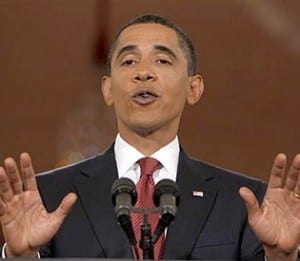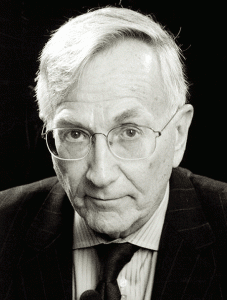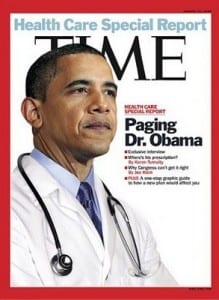The neoconservatives, whose ideas led to so much senseless slaughter and destruction when George W. Bush and Dick Cheney ran the American empire, and their functional equivalents, the humanitarian interventionists who have taken charge under Barack Obama, twaddle on, at opportune moments, about American exceptionalism.
It is one of those expressions, like “the American dream,” that have no fixed meaning, only vague connotations, but that are sometimes useful in political contexts.
Following the dubious lead of Ronald Reagan’s speechwriters, contemporary exponents of the idea moralize the concept. For them, American exceptionalism means American moral superiority.
This understanding is ideologically pernicious, philosophically incoherent, and preposterous on its face. But it does serve a purpose.
President Obama’s September 24 address to the United Nations General Assembly exemplified the idea’s flaws and its uses in a perspicuous way.
It is too bad that this speech, and the self-righteous saber rattling about Syria that preceded it, have already fallen into the great American memory hole. Had their fifteen minutes of news cycle fame lasted longer, the ludicrousness of Obama’s contentions might have become too obvious for even our base and servile media to ignore or deny.
But Tea Party acting out put the kibosh on that prospect. In a display of mindless obstinacy extreme even for them, they decided to shut the government down unless Obama would give in on funding the Affordable Care Act (Obamacare).
The focus of the news cycle therefore shifted away from Obama’s feeble efforts to justify American bellicosity to divisions within the Republican Party, and to the mean-spiritedness and imbecility of the Tea Partiers who now run the show.
This development would not have been all bad, had the corporate media made plain how the reform Republicans now recklessly oppose is essentially a Republican plan – forged in the early 90s at the Heritage Foundation as an alternative to Hillarycare, and implemented, just a few years ago, in Massachusetts under then Governor Mitt Romney.
But that would be too much to expect from them; and indeed, it never came to pass. Instead, Obama’s proclamation of America’s probity emerged unscathed.
And so, a moralized understanding of American exceptionalism is still very much in the public arena, and still doing harm.
It is therefore all but certain that the next time a new military adventure in the Middle East or elsewhere beckons, the neocon-humanitarian interventionist twaddle will resume.
Taking exception to it is therefore still timely and, the media’s attention notwithstanding, as urgent now as it was just a few days ago.
[pullquote]It is too bad that [Obama’s UN] speech, and the self-righteous saber rattling about Syria that preceded it, have already fallen into the great American memory hole. Had their fifteen minutes of news cycle fame lasted longer, the ludicrousness of Obama’s contentions might have become too obvious for even our base and servile media to ignore or deny.[/pullquote]
* * *
What Obama said in defense of the idea was more than usually slippery – in part because he implicitly conflated America’s exceptionalism with his own.
This rhetorical slight of hand has become familiar in the Age of Obama.
Obama uses it, for example, to counter growing popular discontent with the surveillance state he actively superintends.
Edward Snowden’s revelations have brought the Bush-Obama war on centuries old protections against state interferences with individuals’ lives and behaviors into public awareness. But not to worry! Obama will see to it that only good will come from what the NSA and the others do. How could it be otherwise? His moral superiority is beyond reproach; it is exceptional.
Therefore even as his administration trashes privacy rights and Constitutional guarantees of due process, this President, Constitutional scholar extraordinaire, along with Attorney General Eric Holder and the surveillance state’s lesser minions, can be trusted implicitly.
They will do the right thing not just because they are good, but because they are so good that they needn’t abide by rules that constrain others; they are too exceptional for that.
Similarly, in foreign affairs, President Drone wants to be free to kill and maim as he pleases. And so he asks for unstinting trust – on the grounds that America is and always has been the world’s best and most consistent guarantor of freedom and justice.
At the UN, he said, in effect, that America is not just one state among many; its essential goodness puts it in a category by itself.
category by itself.
No matter that in the real world the United States, especially (but not only) after World War II, has been, by far, the main perpetrator of violence and reaction throughout the world, and the main prop for some of the most vicious dictatorships known to humankind.
What matters is that, even when we make mistakes, we are essentially good. This is why the world should acknowledge that a pax Americana is our planet’s best hope.
Obama told the world leaders attending his speech that the peoples of the world already know this in their hearts. The problem is just that some of them are in the thrall of ideologies that preach otherwise — and therefore don’t know that they know.
“Anti-American” ideologies are always at the ready. Communism is gone and secular nationalism is on the wane. But Islamism has arisen to fill the void. The Leader of the Free World knows this well. Since the late 1970s, American governments have been doing their best to stoke the flames.
An so it is that, just as, in the memorable words of the late (and unlamented) Leona Helmsley, taxes are only for the “little people,” international law is for lesser – unexceptional – states only.
Being exceptional, America can make whatever exceptions to international law it pleases – not because it can, but because it is good. This is true now more than ever because now America is led by someone obviously trustworthy and wise — a Nobel laureate, no less.
The same holds, in diminished degree, for countries that participate in America’s essential goodness – Israel, of course, and the UK and sometimes Germany and France along with other obedient, EU countries.
On the other hand, lesser states and peoples, the unexceptional ones, must follow the rules – without exception. When they don’t, or when Obama thinks they don’t, they can rightfully be beaten into submission by any means necessary and suitable to the exigencies of electoral politics in the United States.
In other words, at the UN, Obama did more than merely flaunt the “get out of jail free” card that American presidents have always wielded. He tried to justify deploying it at his pleasure.
Needless to say, few in attendance that day were impressed by the cogency of the case Obama made. They are not fools. They know that, in the arena of world politics, naked power, whenever it feels compelled to justify itself, does so by appealing to high and noble purposes; it always has. In this respect, America is no exception.
But it is different from most because the humanitarian interveners now calling the shots probably are sincere or, what comes to the same thing, exceptionally (unusually) uncynical in their attempts at self-justification.
Do Susan Rice and Samantha Power –or, for that matter, John Kerry, Hillary Clinton and Barack Obama – believe the nonsense they spout? Terrifying as the prospect may be, this seems to be the case.
Perhaps their sincerity makes them less odious ethically than some of their counterparts in other times and places. But, for reasons that Niccolò Machiavelli long ago made clear, in the realm of Realpolitik,cynicism can be and often is a virtue, and sincerity a vice. If Obama understands this, there is no sign of it.
Perhaps the Obama of old, the one who had yet to enter into national politics, understood; we know that he was at least exposed to the arguments. Evidently, years spent stewarding world capitalism are not just morally degrading; they are intellectually debilitating as well.
The problem with a moralized understanding of American exceptionalism is not only that its factual basis is glaringly – preposterously – wrong. The idea is philosophically incoherent.
The reason why, in short, is that morality admits of no exceptions.
Let us say that an ethic provides an account of how a person ought to act; and that morality designates a kind of ethic – one that holds that, in pertinent circumstances, one should act (and deliberate) from an impartial or agent-neutral point of view.
That idea is basic to modern understandings of justice and right; but even at the dawn of the modern era, it was not a new idea. It is anticipated in the ethical theories of many of the world’s religious traditions.
The Golden Rule is an example. To do unto others as you would have others do unto you implies that, from the point of view in question, the moral point of view, what distinguishes oneself from others is of no account; that, for purposes of determining what one ought to do, only what one has in common with other persons matters.
The moral point of view is assumed in most strains of ethical theory. However it has also been subjected to trenchant criticism.
Karl Marx was a critic, though his concerns had to do with real world applications of the moral point of view in class divided societies, not with the soundness of the idea itself.
Marx thought that an ideal society – the (small-c) communism towards which history was moving — would genuinely institutionalize the moral equality of persons. But this side of communism, where class struggle is the rule, institutionalized morality sometimes functions as a snare and illusion that reinforces existing systems of class domination.
Friedrich Nietzsche was a more radical critic; he took issue with the very notion of equality that the moral point of view supposes and therefore with the idea of morality itself.
In pressing his case, he made use of notions of virtue and of inherent differences among human beings that have roots in the ethical traditions of Greek and Roman antiquity and in the thinking of other “heroic” civilizations.
Proponents of American exceptionalism, like Barack Obama, are, to a man and woman, defenders of the class divisions Marx abhorred; and they can hardly be accused of harboring sympathies for the kind of ethical thinking Nietzsche advanced.
If called to explain their stance, they would surely reject notions of inherent gradations of goodness in persons – or nations.
This is why, at the UN, Obama took care to base his assertion of American moral superiority on America’s good deeds on the world stage and on its many sacrifices of blood and treasure.
No matter, again, that the purported goodness of those deeds is a plain confabulation. No matter either that the U.S. came out rather well from World War II in contrast to other belligerents, or that the burdens most Americans have born in the cause of American world domination are trivial in comparison to those America has unleashed on the nations and peoples it dominates.
To be sure, the (mainly) economic conscripts our chicken hawk leaders persist in putting in harm’s way have suffered mightily. Many of them have been driven to despair or even suicide – not to defend their nation, but to implement neoconservative and humanitarian interventionist folly. But their travails pass unnoticed to the vast majority of Americans who bear no sacrifices at all.
In short, the facts are overwhelmingly not on Obama’s side. But even if they were, it would hardly matter because there is no such thing as moral capital — except in the propaganda mills of states intent on justifying their oppression of others by appealing to historical events of the near or distant past.
Thus by declaring itself “the state of the Jewish people,” Israel claims a right to do as it pleases to Palestinians or anyone else in its way – because of what the Nazis did to European Jews more than a half-century ago. Sometimes it is even suggested that victimhood is essentially part of the Jewish condition, and that this somehow frees Israel from the usual norms of international conduct.
At least the Israelis can mount a spurious case in defense of that contention; that Obama would even suggest anything similar for the United States defies credulity.
But even if there were a case to be made, it would be irrelevant.
There is no way to argue for exceptions to the requirements of morality by appealing to the exceptional morality of those for whom the exceptions are claimed. The very idea is self-contradictory.
* * *
The neoconservative-humanitarian interventionist purchase on American exceptionalism also comes with a lineage that conflicts with the drift of the political line its proponents nowadays advance.
For them, American exceptionalism is a tool in global capitalism’s arsenal. It was not always so.
As remarked, the turning point came during the Reagan presidency. It was a by-product of an ideological blitz that drew substantially on Anglo-Protestant, especially Puritan, theology, and on related political currents that had lain dormant for two centuries or more.
Reagan’s reference to “the shining city on the hill,” at the 1984 Republican Convention, is a well-known example.
The more or less intended effect of this way of presenting America’s role in the world is to move the discussion onto a quasi-theological plane — depicting America’s essential goodness as a transcendent property of the state.
Needless to say, this is not the way the effort is usually described. If it were, its ludicrousness would be too apparent to bear even casual scrutiny.
The effect is similar to what has been achieved by calling the Nazi led effort to exterminate European Jewry a “Holocaust.” The biblical reference suggests that ordinary causal explanations cannot explain what happened; that the evil lies outside the scope of ordinary human understanding.
This is nonsense, of course, but at least, in that case, there was a genuine and profound evil to explain. In declarations of America’s essential goodness in world affairs, there is nothing to account for – naturalistically, theologically or in any other way. There is no there there.
This is not to say that talk of American exceptionalism is necessarily pernicious. Before the Reaganite turn, before the expression and the concept it articulates were construed in a moralized way, “American exceptionalism” was a benign and sometimes useful notion.
The idea goes back at least to Alexis de Tocqueville’s account of American democracy in the late 1830s. Tocqueville deemed America qualitatively different from the countries of the Old World; in this way, it was “exceptional.”
The differences, he thought, were striking enough to call for a fresh understanding of historical trajectories and democratic forms. The absence of a feudal past figured importantly in Tocqueville’s discussion, as did other ostensibly unique features of the American situation.
Decades later, a number of historians — Charles Beard and Frederick Jackson Turner, among others – were struck by the feebleness of the socialist movement in the United States. In this respect, the United States seemed qualitatively different from contemporaneous industrialized societies. This exception to the rule likewise called for an explanation.
To account for this American exceptionalism, they made much of the fact that, up to their time, there had always been a frontier ready to absorb people whose discontents might otherwise have taken a less exceptional turn. Other pertinent factors included levels of immigration that gave rise to animosities that blocked the formation of social solidarities; and, of course, there was the race question, as there always is.
On the whole, these pre-Reagan invocations of the term, and more often of the concept associated with it, came from the Left. In the late 1920s, there was even a Communist version of American exceptionalism, associated with Jay Lovestone, a leader of the American Communist Party.
Lovestone thought that America’s industrial power and seemingly unlimited resources exempted it from the usual “laws of development” of capitalist societies. Stalin promptly quashed that heresy; and, by the 1930s, the idea was heard no more in Communist circles.
Thus it has only been in the past several decades that “American exceptionalism” has changed sides; that the idea has been invoked to justify according carte blanche to American governments to do as they please.
The appropriation of the idea within liberal-imperialist ranks is newer still. Its roots go back barely two decades – to ill-informed reactions to events in Bosnia and Rwanda. The prominence this way of thinking now enjoys is, for the most part, a creature of Obama’s presidency.
* * *
The questions that first raised the idea of American exceptionalism remain pertinent and, to some extent, unresolved. But in view of what has happened to the term in the current period, it is perhaps best that it be retired.
In its moralized sense, American exceptionalism is a noxious doctrine. Reduced to its core, it amounts to nothing more than an expression of raw power – one that puts the United States beyond legal or customary constraints, that gives it license to do what it wants because it can.
This was probably not what Obama had in mind by the slogan “yes, we can.” It is certainly not what his supporters thought he meant. But it is what his foreign and military policies amount to. Notwithstanding all the blather “American exceptionalism” has elicited of late, there is nothing more to it than that.
ANDREW LEVINE is a Senior Scholar at the Institute for Policy Studies, the author most recently of THE AMERICAN IDEOLOGY (Routledge) and POLITICAL KEY WORDS (Blackwell) as well as of many other books and articles in political philosophy. His most recent book is In Bad Faith: What’s Wrong With the Opium of the People. He was a Professor (philosophy) at the University of Wisconsin-Madison and a Research Professor (philosophy) at the University of Maryland-College Park. He is a contributor to Hopeless: Barack Obama and the Politics of Illusion (AK Press).






 the business section reported what I have reported for years: that real median family incomes in the US are where they were a quarter of a century ago. In other words, in a quarter of a century there has been no income growth for the median American family.
the business section reported what I have reported for years: that real median family incomes in the US are where they were a quarter of a century ago. In other words, in a quarter of a century there has been no income growth for the median American family.